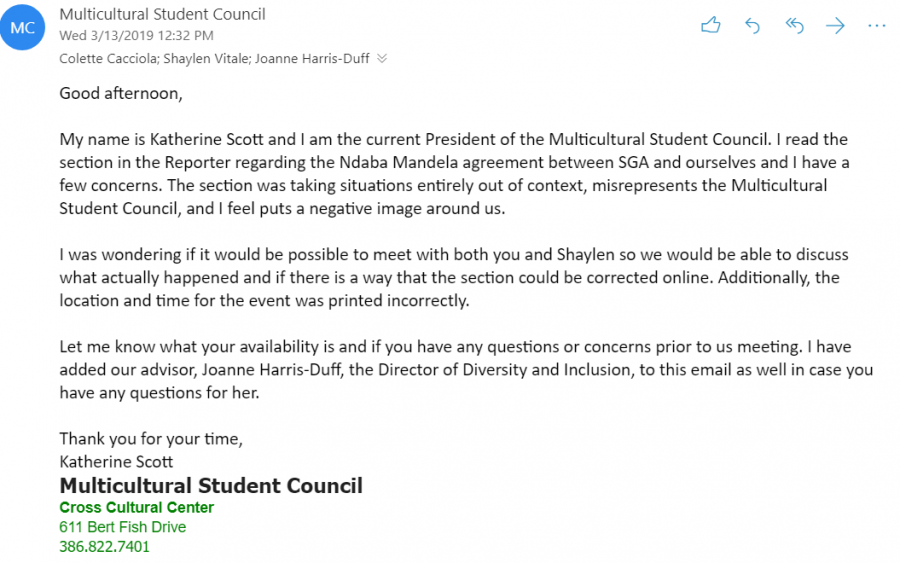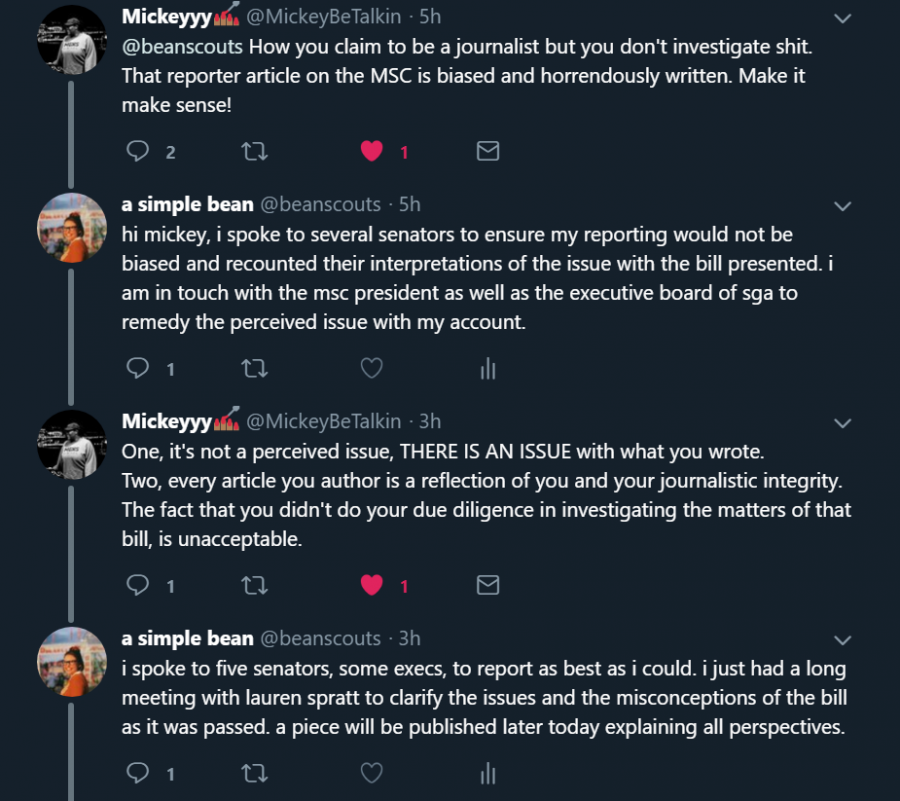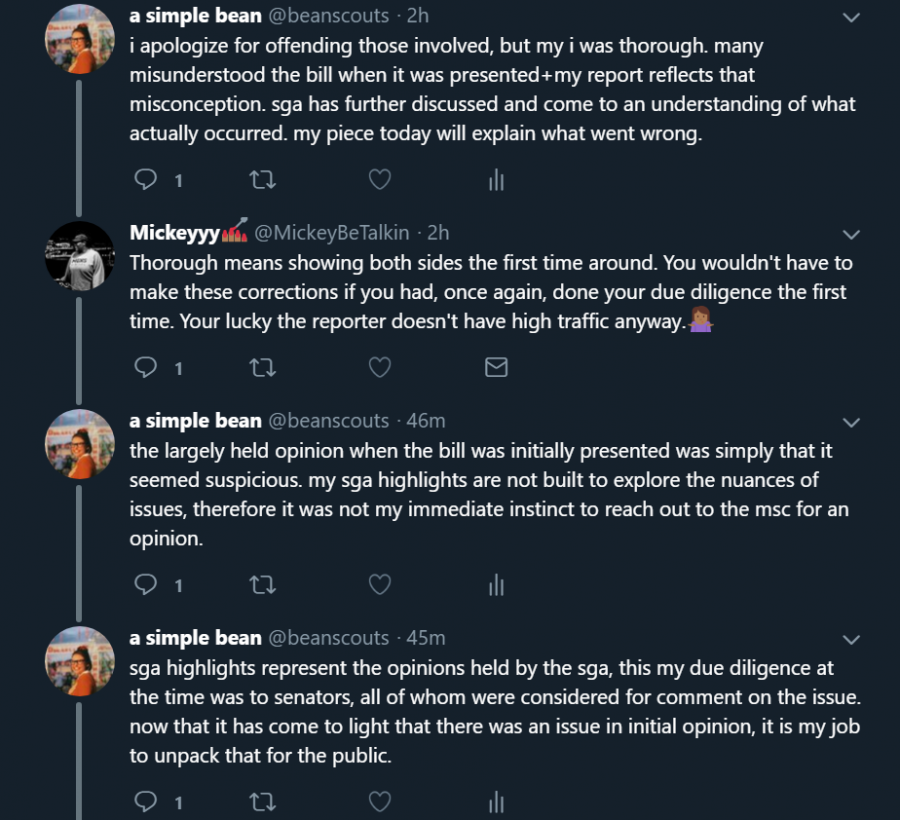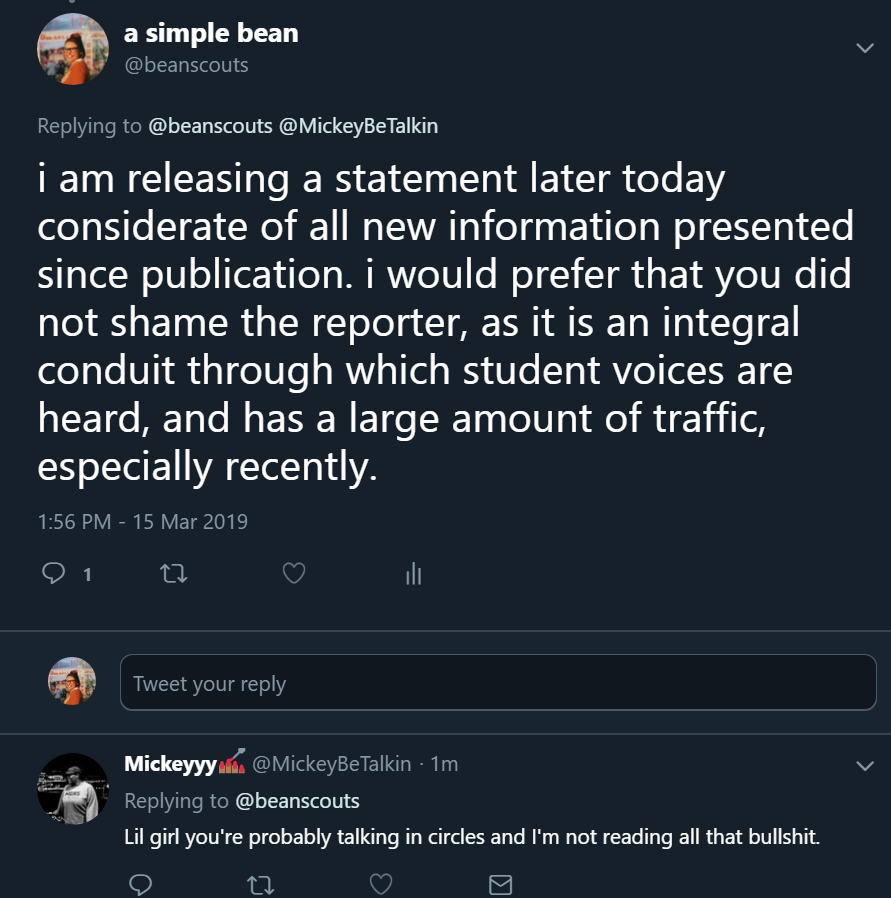An explanation
concerning the MSC controversy
March 15, 2019
In Issue IV of The Reporter, I was given the responsibility of writing up a series of highlights from the last month or so of SGA goings on. Admittedly, although I thoroughly enjoyed my work on the highlights and enjoy attending SGA meetings, I never imagined that it would attract much attention, especially considering other pieces I was working on at the time.
However, one section caught the attention of several members of the student body and ignited a lot of concern. What I said went as follows:
“During the SGA meeting on February 13th, it was brought to our attention that the Multicultural Student Council is bringing Ndaba Mandela, Nelson Mandela’s grandson, to speak at Stetson. In the context of the SGA meeting, they requested $6,975 for this event. However, it seems that they have already paid for the event and are asking for additional funding because they do not want to cancel programs they had previously planned to hold. Take this as you will.”
At the time I wrote this, I had spoken to several senators to clarify the meaning of the bill as it passed through the senate in order to understand myself what it meant. It is always my priority to ensure that due diligence has been done concerning all aspects of my reporting. Soon after publication, however, students reached out expressing concern about the report, including the Multicultural Student Council’s president, Katie Scott.

In addition, I received messages on my personal Twitter expressing disappointment in my one-sided reporting.



My understanding of the issue was formed by my initial discussion with several senators who took issue with the presentation of the bill. In my response to Katherine’s email, I explained this background by saying:
“I reached out to several SGA senators for clarity regarding the bill the MSC brought before the senate to avoid misinformation, and their statements gave me the understanding that the MSC went about securing funding both retroactively and in an unconventional way. Generally, organizations present their budgets before SGA via their treasurer, which I have had to do before for the other organizations I am involved in. The senators I spoke to implied that drafting a bill to secure funding is unprecedented, and in many ways disrupts standard procedure and practice, especially because this funding was not requested before the event had been paid for.”
This was, in fact, the perception many initially had on the issue. To further understand, I reached out to several members of SGA, including the Vice President, Lauren Spratt. In our discussions, we were able to confirm that many senators were unclear on why exactly a bill was being presented to fund an MSC event when the MSC is not funded via SAFAC, which is intended to be distributed to student organizations. The MSC is instead funded in the same way as SGA itself is, through AFAC, which is comprised of Student Life Fees not allocated toward the SAFAC fund.
The event, a workshop and discussion with the grandson of Nelson Mandela, had already been paid for in part, but the other half of funding had not yet been supplied. According to Katherine, “there were many departments around campus that have expressed interest in wanting to partner for this event but we wanted to first reach out to SGA because of the success with the partnership of Taste of the World last semester and this would be an excellent opportunity for the students.”
I brought this to Lauren in our meeting to unpack this further, and she explained it to me as a relatively new “symbolic partnership” forged between the two groups to foster a supportive working relationship. Past events had been funded in part by SGA by means of the same process, proposing and passing a bill, not because it was their job to do so, but because it acts as a representation of mutual trust and support.
What was unusual in this case was that the amount being asked for was higher than it had been in the past, and so there was skepticism from senators concerning the validity of funding an organization that does not fall under the SAFAC umbrella. According to Katherine, “…the MSC could use the rest of our entire budget to fund this speaker because we strongly believe in what Ndaba Mandela stands for but in order to do that, we would have to cancel the rest of our planned programming, which is obviously not ideal.”
Senators I reached out to for comment further suggested that “a large issue…was that [the bill] was pushed through [Diversity and Inclusion], not through Finance, where it should have been.”
“It seems that these things should be funded by the school…this issue is a symptom of a larger problem, which is that Stetson is underfunding things such as MSC and the Title IX office,” another senator weighed in.
The crux of this issue is that the MSC did not seem to have a way to fund other events they had already planned to hold if funding was not procured for the Mandela event from outside sources. This is where senators took issue, and this is what my focus was on within my SGA highlights, which, as their title implies, have everything to do with what is happening in SGA and what the SGA senators’ perception is of these happenings.
The Ndaba Mandela event, if you are interested in attending, is occurring on Tuesday, March 26th, at 7pm in the Stetson Room.







